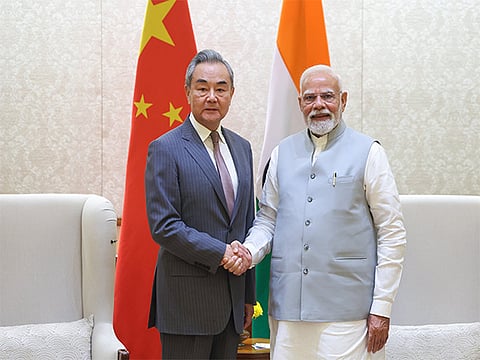Indian PM to visit China on August 31, security chief says
China attaches great importance to Modi's visit to the SCO summit, Wang says

New Delhi: Indian Prime Minister Narendra Modi will visit China later in August, his security chief said on Tuesday during talks with Beijing's foreign minister in New Delhi.
Modi will attend the Shanghai Cooperation Organisation (SCO) summit opening on August 31 in Tianjin, his first visit to China since 2018, Ajit Doval said in public comments at the start of a meeting with Beijing's Foreign Minister Wang Yi.
"Our prime minister will be visiting for the SCO summit," Doval said, speaking of "new energy" in diplomatic ties.
Wang said China "attaches great importance" to Modi's visit to the SCO summit, according to an official translator.
"History and reality prove once again that a healthy and stable China-India relationship serves the fundamental and long-term interests of both of our countries," Wang added.
The Indian premier said late on Tuesday he was "glad to meet" Wang in New Delhi.
"Since my meeting with President Xi (Jinping) in Kazan last year, India-China relations have made steady progress guided by respect for each other's interests and sensitivities," Modi said in a post on social media platform X.
"I look forward to our next meeting in Tianjin on the sidelines of the SCO Summit," he said.
"Stable, predictable, constructive ties between India and China will contribute significantly to regional as well as global peace and prosperity."
India also raised concerns with Wang about the construction of a mega-dam on a river that runs through Tibet and India and the effect it could have on downstream states, Delhi's foreign ministry said in a statement.
"The need for utmost transparency in this regard was strongly underlined," it said.
Beijing approved the project in December on the river -- known as Yarlung Tsangpo in Tibet and Brahmaputra in India -- linking it to China's carbon neutrality targets and economic goals in the Tibet region.
Once built, the dam could dwarf the record-breaking Three Gorges Dam on the Yangtze River in central China -- and have a potentially serious impact on millions of people downstream in India and Bangladesh.
India is also part of the Quad security alliance with the United States, Australia and Japan, which is seen as a counter to China.
However, caught in global trade and geopolitical turbulence triggered by US President Donald Trump's tariff war, they have moved to mend ties.
Wang said during talks on Monday with Subrahmanyam Jaishankar, India's foreign minister, the two countries should "view each other as partners and opportunities, rather than adversaries or threats".
Sign up for the Daily Briefing
Get the latest news and updates straight to your inbox



